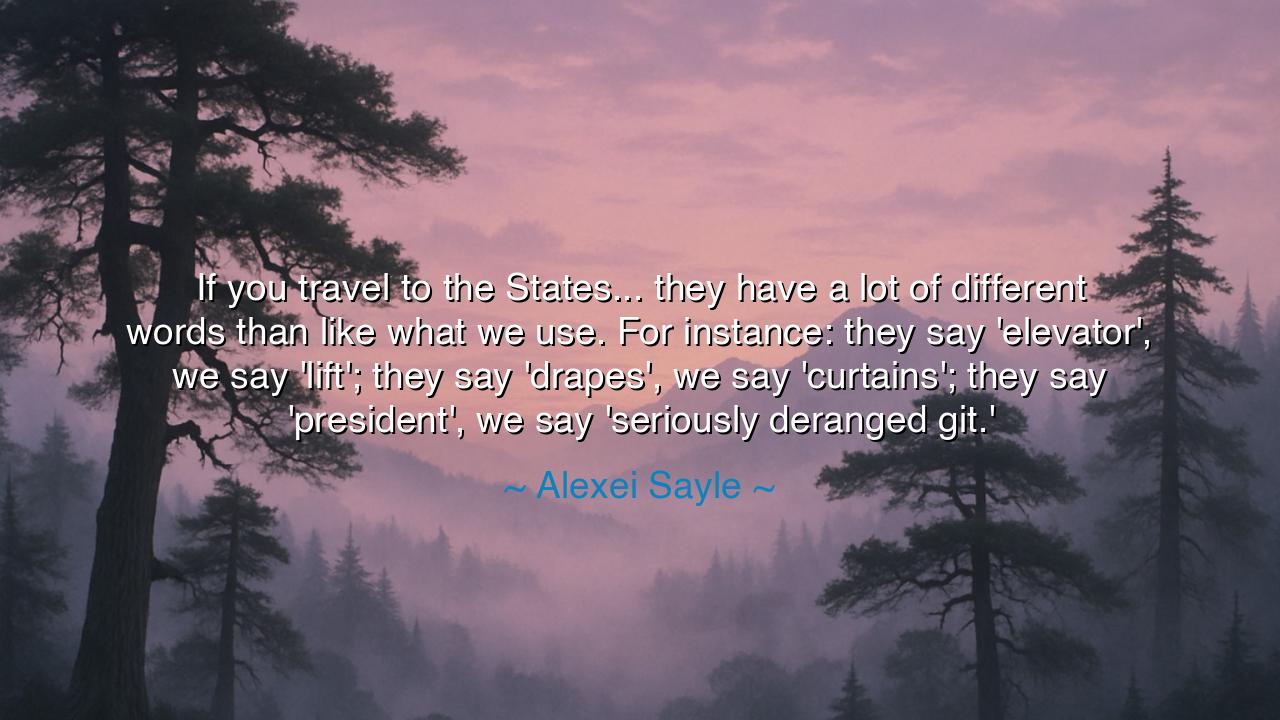
If you travel to the States... they have a lot of different
If you travel to the States... they have a lot of different words than like what we use. For instance: they say 'elevator', we say 'lift'; they say 'drapes', we say 'curtains'; they say 'president', we say 'seriously deranged git.'






Alexei Sayle, with the sharp tongue of the satirist and the keen eye of the observer, once jested: “If you travel to the States... they have a lot of different words than like what we use. For instance: they say ‘elevator,’ we say ‘lift’; they say ‘drapes,’ we say ‘curtains’; they say ‘president,’ we say ‘seriously deranged git.’” Though clothed in humor, these words reveal a deeper truth about the gulf and the kinship between cultures: that language itself is a mirror of thought, and in jesting about our differences, we expose not only our words, but our values.
The origin of this jest lies in the eternal contrast between British and American English, two branches of the same tree, grown apart through centuries of history, politics, and culture. To some, these differences are trivial quirks: “lift” or “elevator,” “curtains” or “drapes.” Yet Sayle, as the jester of his age, sharpens the knife of satire when he leaps from these household terms to the term of power—“president.” In this final substitution, his humor strikes like a lightning bolt, exposing not just linguistic variation, but political judgment. The satirist reminds us that language does not only describe the world; it critiques it.
The ancients revered such voices. In Athens, the comic poets like Aristophanes used laughter to reveal truth, mocking the leaders of the city to show their folly. Just as Aristophanes could call a statesman by names that pierced his pride, so Sayle cloaks criticism in comedy, using the joke as a weapon against the powerful. In his playfulness, there is both mirth and menace: mirth for the audience who laughs, menace for the leader who finds himself the butt of the jest.
History shows us that the jester has always been more dangerous than the sword. In the courts of kings, the fool could speak truths that none else dared, his motley protecting him where armor could not. In Elizabethan England, the figure of Feste in Shakespeare’s Twelfth Night mocked nobility with riddles and puns, reminding the mighty of their mortality. So too Sayle, in his modern costume of comedian, plays the ancient role of truth-teller, delivering wisdom under the mask of wit.
But let us not dismiss the first half of his words, for they too carry meaning. The differences between elevator and lift, drapes and curtains, remind us that language is more than utility; it is identity. Words are the vessels of culture, bearing centuries of history, tradition, and humor. To notice these differences is to remember that the world is vast, that even those who share a tongue may not share the same reality. The traveler must learn not only the customs of a land but also the words by which that land reveals itself.
The lesson of Sayle’s quip is thus twofold. First, that laughter is a form of wisdom, showing us truths we might resist if spoken sternly. And second, that language is both bridge and barrier—it unites us in communication, yet it reminds us of our differences. To travel and to hear new words is to be humbled, to be reminded that one’s own way of speaking is not the only way of seeing. And to laugh at the words of others is to acknowledge both the absurdity and the beauty of human variety.
Practically, this means that as we travel or encounter other cultures, we must listen more than we speak. We must delight in differences, learn their meanings, and not be afraid to laugh—both at others and at ourselves. But we must also listen for the satire hidden in humor, the critique masked in jest, for comedians, like the jesters of old, are often the truest prophets.
Thus, Alexei Sayle’s playful line, born of jest, carries ancient weight: language is not only about words, but about the truths those words conceal and reveal. To notice the difference between “elevator” and “lift” is to smile at the quirks of culture; to call a president a “seriously deranged git” is to remember that even the highest office is not beyond the reach of ridicule. In laughter, we find truth; in truth, we find freedom.






AAdministratorAdministrator
Welcome, honored guests. Please leave a comment, we will respond soon